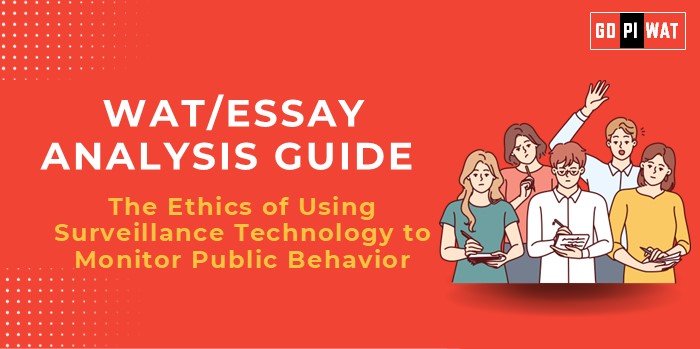📋 WAT/Essay Analysis Guide: The Ethics of Using Surveillance Technology to Monitor Public Behavior
🌐 Understanding the Topic’s Importance
Public surveillance highlights a critical intersection of technology, ethics, and policy, offering B-school candidates a chance to explore how data-driven systems impact governance, privacy, and societal norms.
📝 Effective Planning and Writing
- Time Allocation:
- Planning: 5 minutes
- Writing: 20 minutes
- Review: 5 minutes
- Preparation Tips: Identify key ethical frameworks (e.g., utilitarianism, deontology) and relevant case studies.
✨ Introduction Techniques for Essays
- Contrast Approach: “While surveillance reduces crime, it raises questions about privacy and ethical use of data.”
- Timeline Approach: “From rudimentary CCTV setups to advanced AI monitoring, surveillance has transformed public spaces, necessitating a debate on ethics.”
📚 Structuring the Essay Body
- Achievements: Highlight crime reduction and urban efficiencies using data.
- Challenges with Comparative Analysis: Examine privacy issues, biases, and global examples.
- Future Outlook: Suggest ethical deployment frameworks and public consultation mechanisms.
📌 Concluding Effectively
- Balanced Conclusion: “Surveillance technology promises safer societies but risks individual freedoms. Ethical use requires clear regulations and public accountability.”
- Global Comparison Conclusion: “While China’s model exemplifies innovation, the EU sets an ethical standard with its citizen-first approach to surveillance.”
📊 Analyzing Successes and Shortcomings
- Key Achievements: Reduced crime, smart urban planning, pandemic response.
- Ongoing Challenges: Privacy erosion, data breaches, AI biases.
- Global Context: EU’s GDPR vs. China’s surveillance-led governance.
💡 Recommendations for Sustainable Progress
- Develop clear ethical guidelines for surveillance use.
- Establish independent oversight committees.
- Encourage public engagement and transparency in policy formation.
📄 Sample Short Essays
- Balanced Perspective: Surveillance safeguards society but must not undermine personal freedoms; ethical frameworks and public oversight are crucial.
- Solution-Oriented: Ethical use of surveillance requires transparent algorithms, robust cybersecurity, and laws protecting privacy.
- Global Comparison: The EU prioritizes citizen rights, while China’s approach demonstrates scalability, offering contrasting lessons for policymakers.


